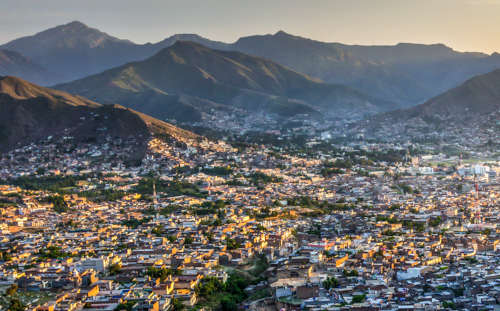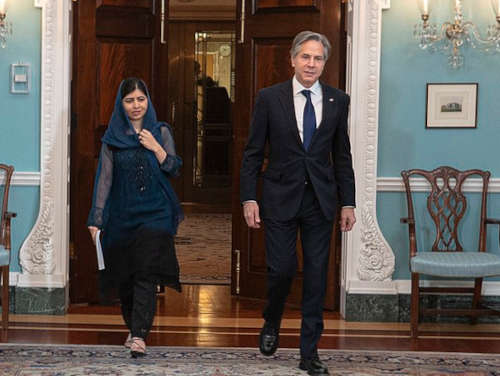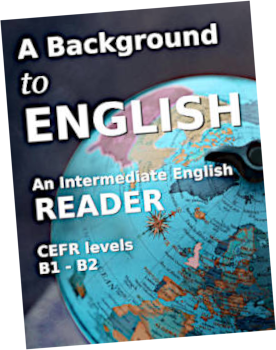WITH AUDIO. ►: Click to open/close audio player
Born
in 1997 in the wild Swat valley in northwest Pakistan, Malala
Yousafzai won a Nobel Prize for Peace before she was 18. She was the
youngest person ever to win such an important prize.

Mingora, where Malala was born and grew up.
Malala is a young woman who has become one of the world's most powerful voices for education and human rights. She grew up in a place where girls did not always have the same opportunities as boys. Her father was a school teacher who believed strongly in equal education for boys and girls. He encouraged his daughter to learn, to think for herself, and not to hide her views.
Malala grew up happily for the first ten years of her life; but when she was about ten years old, the Taliban - a violent extremist group - took over her region. They brought in strict rules, especially for women and girls. One of those rules said that girls were not allowed to go to school. Many families were afraid, and kept their daughters at home. But Malala refused to be silenced.
When she was eleven, she began writing a blog for the BBC under a fake name, talking about her daily life under the Taliban. She explained what it felt like to watch her school shut down, and how she missed learning. Her words were simple but powerful, and her blog attracted followers worldwide. Later, when her identity was made public, she began giving interviews and speaking in public about the right to education. Taliban extremists did not like this.
In October 2012, as she came home from school, the bus she was on was stopped by Taliban gunmen. Malala was taken out and shot in the head. She was very badly hurt, but not killed. Needing very specialist surgery, she was flown to a hospital in England, where doctors worked hard to save her life. They succeeded, and Malala slowly got back her strength. And what strength! Instead of hiding away, she chose to speak even louder.

Malala in Washington, with US Secretary of State A Blinken. 2021.
The following year, and before she had reached her eighteenth birthday, she was awarded the Nobel Peace Prize – the youngest Nobel prize-winner in history. She shared the prize with an Indian activist called Kailash Satyarthi, who also works to protect children’s rights.
Malala later wrote a book with the title "I Am Malala", telling her full story and explaining why she continues to fight for education. The book has been translated into over 40 languages. On one page she writes, “They thought the bullets would silence us, but they failed. And then, out of that silence came thousands of voices.” These words show her belief that even in the face of violence, ideas and truth cannot be destroyed.
Although she had become a celebrity, Malala continued her own education. In 2020, she graduated from Oxford University with a degree in Philosophy, Politics, and Economics. She said it was one of her proudest moments, and proof that education changes lives. Today, she keeps on campaigning for girls’ education, particularly in countries that are affected by war or poverty.
Malala’s story reminds us that brave people are not always loud and strong; they may just be quiet people, asking a simple question, like: “Why can’t I go to school?” Her journey from Pakistani schoolgirl to international celebrity shows what is possible when a person decides to fight back against prejudice and injustice. Like Greta Thunberg, she has taught us that young people are not just the leaders of tomorrow - they can also lead today.

opportunities: options or possibilities - equal: the same - fake: false - missed: felt the absence of - shot: hit by a bullet from a gun - surgery: medical action - refugee: person fleeing from a country - was awarded: received - shared: received together - failed: did not succeed - proof: confirmation - graduated: received a diploma - poverty: poorness, being poor - prejudice: discrimination,
Return to Linguapress site index
Copyright © Linguapress. Do not copy this document to any other website
Copying permitted for personal study, or by teachers for use with their students
Student Worksheet
Malala
1. Interactive
- Missing
verbsReplace the verbs that are missing from these extracts from the article. Here, in alphabetical (A - Z) order, are the verbs that you will need to use. Make sure that you put each verb in the right tense or form;
become, come, fail, follow, give, go, let, meet, say, set, speak, tell, think, write,
In the years that , Malala a global symbol of courage
and hope. With her father, she up the Malala Fund,... She to
refugee
camps, world
leaders, and at international events.
In 2013, she a powerful speech at the United Nations, , “
us remember: One book, one pen, one child, and one teacher can change
the world.
Malala later a book with the title "I Am Malala", her full story...... On one page she writes, “They the bullets would silence us, but they And then, out of that silence thousands of voices.”
Malala later a book with the title "I Am Malala", her full story...... On one page she writes, “They the bullets would silence us, but they And then, out of that silence thousands of voices.”
2. Interactive - Phrasal verbs
Here are eight verbs used in the text. bring in, fight back, get back, grow up, keep on, set up, shut down, take over.
Put each verb into the correct box in first column, to match a meaning in the second column.
| Phrasal verbs | Meanings |
| Took control of | |
| Spent the years of her childhood | |
| Resisted | |
| Created, established | |
| Continued | |
| Introduced | |
| Close | |
| Regained, found again |
3. Interactive - MCQ - True, false or not given?
Read the text, and decide whether the following statements are true or false, or whether the article does not say.
- Before she was attacked, Malala had already become well known for her campaigning work.
- The Taliban issued rules that applied equally to both boys and girls .
- Malala was the only person injured in the attack on the school bus.
- Her father played an important role in shaping Malala’s values and beliefs.
- Malala was treated in a hospital outside of Pakistan.
- Malala gave her speech at the United Nations after she had won the Nobel Prize.
- Her book explains why she continues her campaign for girls’ education.
- Malala's Nobel Prize was awarded jointly with another young woman activist.
- Malala completed her degree in Philosophy, Politics, and Economics in Pakistan.
- Malala believes that speaking out can be more powerful than violence.
Teachers:
The exercises above can be used individually by students, or else used as class exercises if projected onto an interactive whiteboard.If your classroom is suitably equipped, open up this document twice, in two windows; project the text in one window and the interactive exercises in the other, placing them side by side.
Phrasal and prepositional verbs.
Relating to the exercise above. There is an interesting selection of phrasal and prepositional verbs in this article: here are the main examples:Prepositional Verbs
(always inseparable, structure: verb + Preposition):
ask for, believe in, fight for, graduate from, speak about, translate into
Phrasal Verbs (Idiomatic, separable when transitive, structure: verb + particle):
bring in, fight back, get back, grow up, keep on, set up, speak out, take over, take out
ask for, believe in, fight for, graduate from, speak about, translate into
Phrasal Verbs (Idiomatic, separable when transitive, structure: verb + particle):
bring in, fight back, get back, grow up, keep on, set up, speak out, take over, take out
For a clear explanation of the important but confusing question of phrasal and prepositional verbs in English, the distinction between the two, and their use as transitive or intransitive verbs, see section 1.18 (ps 68 - 73) in Rossiter's Descriptive Grammar of English, new edition 2023.
This teaching resource is © copyright Linguapress 2025
Republication on other websites or in print is not authorised
| Linguapress; home | Découvrez l'Angleterre (en français) | Discover Britain |




